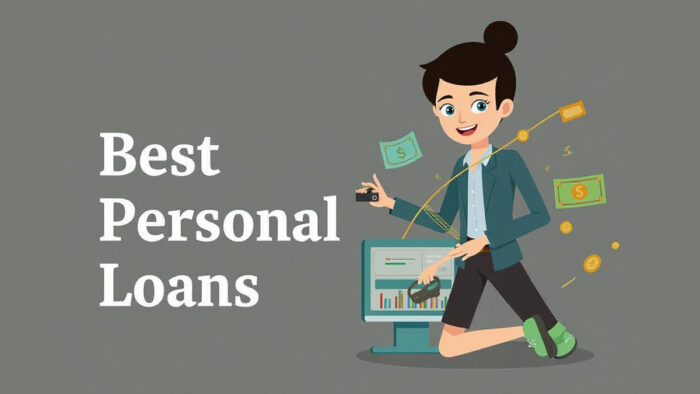If you have reached the limit with your federal and private student loans and you are still in need of money, you may need other financial options. This is where personal loans for students come in.

Personal loans are good ways to cover urgent college expenses quickly. Although lenders may not allow you to make use of the personal loans for education reasons, you can make use of them for food, medical expenses, rent, and other expenses.
Also, rates may be very high among lenders. Due to this reason, it is advisable for borrowers to compare available loans. And make sure that they understand every one of the terms and conditions before choosing one.
The best personal loans for you as a student will cover some education expenses. And offer flexible amounts, lengthy repayment terms, and competitive interest rates.
8 Best Personal Loans for Students in 2024
In this article, we have compiled the list of the best personal loans for students. Read to the very end, and check them out.
1. SoFi
SoFi is the overall best lender that offers personal loans for students across the United States. With over $50 billion in loans extended, SoFi is notable for its high loan limits and flexible terms. Borrowers can access loans ranging from $5,000 to $100,000, although exact amounts may vary by state.
Repayment periods span from two to seven years, catering to individuals with a credit score of at least 650 and a minimum annual income of $45,000. SoFi allows joint applications but does not permit co-signers.
One of the key advantages of SoFi personal loan is its competitive APRs and the absence of origination fees, late fees, or prepayment penalties. This makes it a cost-effective option compared to many other lenders who typically impose such charges.
However, for debt consolidation, SoFi does not facilitate direct payments to creditors. Instead, the loan amount is deposited into your bank account, and it’s your responsibility to settle your debts. Despite this, the lender offers a range of additional perks and discounts to its customers.
2. Kora
Kora is a unique lender that caters exclusively to college students. This lender provides small loans for up to 12 months. Loan amounts range from $25 to $3,000, and funds can be used for nearly any expense, as stated on Kora’s website. Just so you know, repayment can be made either bimonthly or monthly.
Kora’s services are available in 20 states in the United States.
3. LightStream
LightStream provides unsecured personal loans from $5,000 to $100,000, with amounts depending on the loan’s purpose. Known for its low and competitive interest rates, LightStream even offers a rate-beat program. The lender charges no origination, late payment, or prepayment fees, making its terms especially attractive. Borrowers can also receive a 0.50% rate discount by enrolling in autopay.
Just so you know, the requirements for eligibility include a minimum credit score of 660. However, this lender does not disclose its minimum income requirement. Co-borrowers are allowed, adding flexibility for applicants.
4. Upgrade
Upgrade is a viable choice for students with poor or fair credit, requiring a minimum credit score of only 560. It offers repayment terms ranging from two to seven years.
However, if you’re looking to cover postsecondary education expenses like school supplies or room and board, you’ll need to consider other lenders.
Upgrade provides free credit monitoring and educational tools to help students improve their credit scores. You can apply for a loan online quickly and receive a decision within seconds. Additionally, there are no prepayment penalties.
5. LendingPoint
LendingPoint is an online lender. This lending institution offers personal loans in 48 states and Washington, D.C., excluding Nevada and West Virginia. Eligible borrowers can apply online and receive quick funding.
Loan amounts range from $1,000 to $36,500, though in Georgia, the minimum loan is $3,500. Repayment terms span from 24 to 72 months.
However, LendingPoint has some drawbacks, including high maximum APRs and origination fees up to 10%, varying by state. A high credit score can help you avoid steep APRs.
6. Upstart
Upstart accepts applicants with credit scores as low as 300, making it a good choice for those with limited or no credit history. Upstart evaluates additional factors like your college major and the school you attended during the application process.
When prequalifying, you can specify college or graduate school as the loan purpose. If approved, funds can be available as soon as the next business day. Upstart’s unique underwriting approach considers academic history alongside credit score and income.
Additionally, Upstart offers resources for financial education, such as articles and webinars, to help improve financial literacy. There are no prepayment penalties.
7. Universal Credit
Universal Credit offers personal loans ranging from $1,000 to $50,000 through its partners, with repayment terms of three to seven years.
Though it provides access to loans for those with poor credit, there are some downsides. The APRs are higher than the most competitive rates available, and there’s an origination fee between 5.25% and 9.99% on all loans. This fee is deducted from the loan amount, so it’s important to account for this when determining how much to borrow to ensure you receive the needed funds.
8. Discover
Discover is a popular online bank known for its credit cards and retirement solutions. This financial institution also provides personal loans across all 50 states. It features an online application process, mobile banking tools, a customer support team, and highly rated and fast funding.
Loans range from $2,500 to $40,000, with repayment terms of three to seven years, offering flexibility despite potentially higher loan amounts available elsewhere. While Discover does charge a late payment fee and lacks an autopay discount, it stands out by not charging origination fees or prepayment penalties, making it competitive with other leading personal loan providers.
Does taking out a personal loan as a student make sense?
Well, this decision depends on your financial circumstances. It could be a good decision if you have exhausted all of your financing options, you can afford to pay back the loan, and you can qualify for a good interest rate. If you cannot afford to pay back the loan, it is advisable that you explore other options. Defaulting on loan payments can greatly affect your credit score.



